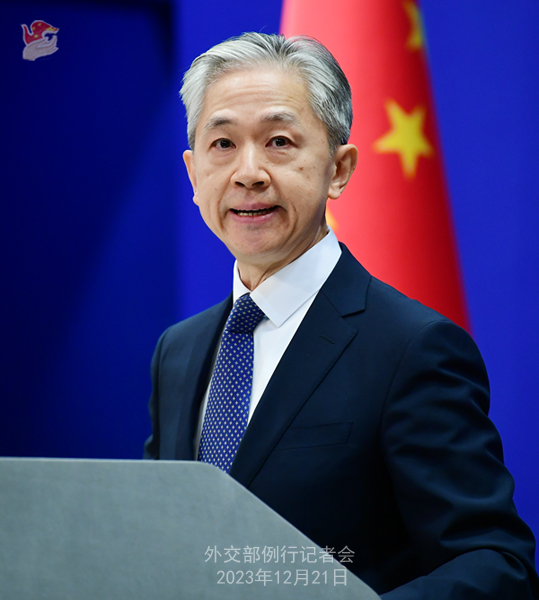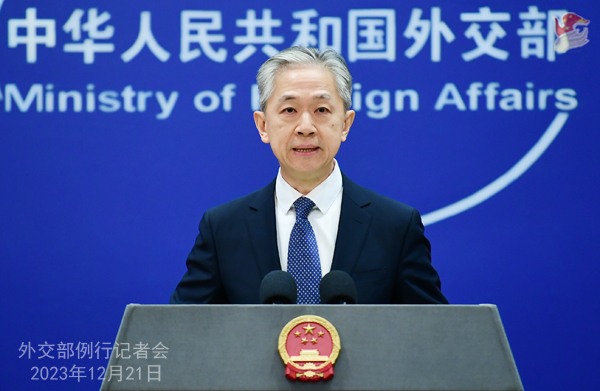| Foreign Ministry Spokesperson Wang Wenbin’s Regular Press Conference on December 21, 2023 |
| 2023-12-21 20:06 |
|
CCTV: Recently, Steven Barnett, IMF Senior Resident Representative in China, said in an interview that China will contribute one-third of global economic growth in 2023. He predicted that higher and more resilient growth is within reach for China in 2024. What’s your comments? Wang Wenbin: We noted that interview. Lately, many international organizations like the IMF and the OECD have revised up their 2023 growth projections for China and are confident in China’s economic prospects next year. China is widely considered the biggest driver for the world economy. The research of the IMF shows that faster growth in China has positive spillovers on the rest of the world. A one percentage point increase in China would, on average, increase the level of output in other economies by 0.3 percent. China has a hyper-scale market with the biggest potential in the world. Macroeconomic policies introduced by the Chinese government have given the economy a strong push. There is ample room for enhanced implementation of monetary and fiscal polices. China’s deepening of reform and opening up across the board provides strong impetus for sustained sound economic development. A new round of scientific and technological revolution and industrial transformation in the world also presents a broad stage for the Chinese economy. All in all, there are more favorable conditions than adverse factors for China’s development, the trend of economic rebound and sound long-term trajectory has not changed, and the factors and conditions supporting high-quality development are increasing. We welcome businesses from around the world to continue coming to China for global success. We will continue to expand high-level opening up, improve the business environment, step up intellectual property protection, form an open and globally competitive innovation eco-system and share with the world China’s development achievements. AFP: On Tuesday, the spokesperson said that China’s maritime disputes with the Philippines do not represent the entirety of the bilateral relationship and that China was willing to handle them through dialogue and consultation. However, yesterday, the Chinese side said the bilateral relationship is at a crossroads until the Philippines to proceed with caution. Can the Foreign Ministry provide a reason for this sudden change in the tone of the statement towards the Philippines? Wang Wenbin: I suggest that you take another close look at the readout that we released on the phone call between Chinese and Philippine foreign ministers. It is absolutely wrong to think that there has been a major change in China’s tone on the issue. Yesterday, Member of the Political Bureau of the CPC Central Committee and Foreign Minister Wang Yi had a phone call with Philippine Foreign Affairs Secretary Enrique Manalo at the request of the Philippines. Foreign Minister Wang Yi said that China-Philippines relations face serious difficulty and the root cause lies in the Philippines’ change of policy and position, refusing to honor its commitment and repeated provocations that undermine China’s legitimate and lawful rights and interests. The bilateral relationship is now at a crossroads. Where it will go depends on what choice will be made. The Philippines must be very prudent about it. On what you said, I would like to stress that when it comes to maritime disputes with our neighbors, China’s position is consistent and clear without any change. Our commitment to properly managing disputes through dialogue and consultation has not changed. Our willingness to work with the Philippines to implement the previously reached understandings has not changed. Our policy of working with the Philippines and other ASEAN countries to safeguard peace and stability in the South China Sea has not changed. Last but not least, our resolve to safeguard our sovereignty and legitimate rights and interests has not changed and will not change. We hope that the Philippines will decide rationally, follow the effective way for neighbors to get along with each other and work with China to properly handle and manage the situation at sea.
Bloomberg: Reports show that the Chinese leader said Beijing would reunify with Taiwan, but the timing has not yet been decided. Can I get your reaction? Wang Wenbin: During his meeting with President Biden in San Francisco this November, President Xi Jinping outlined China’s principled position on the Taiwan question. He pointed out that the Taiwan question remains the most important and most sensitive issue in China-US relations. China takes seriously the positive statements made by the United States in the Bali meeting, and the US side should take real actions to honor its commitment of not supporting “Taiwan independence,” stop arming Taiwan, and support China’s peaceful reunification. RIA Novosti: The US State Department’s spokesperson Matthew Miller said earlier that the United States would welcome China playing a constructive role in trying to prevent attacks in the Red Sea. I wonder if China is ready to play more active role in ensuring security in the Red Sea region. Wang Wenbin: The Red Sea is an important international trade route for goods and energy. Safeguarding the security and stability of the region serves the common interest of the international community. China stands for protecting the safety of international sea lanes and against causing disturbance to civilian ships. We believe relevant parties, especially major countries with influence, need to play a constructive and responsible role in keeping the shipping lanes safe in the Red Sea. AFP: Given the continued fighting in Myanmar especially the fighting near planned development along the China-Myanmar economic corridor, does the Foreign Ministry have any new comments on the conflict there? Wand Wenbin: We have repeated China’s position on the situation in northern Myanmar. China has been working actively to get relevant parties in Myanmar to effectively implement what has been agreed, exercise maximum restraint, actively ease the situation on the ground, properly manage sporadic confrontation events during ceasefire and maintain the momentum of ceasefire and peace talks. China will continue its effort in helping to stop the fighting and promote talks in northern Myanmar and jointly work for a soft landing of the situation in northern Myanmar. We also hope that parties concerned in Myanmar will keep the China-Myanmar border area peaceful and stable and protect the safety and security of Chinese projects and personnel in Myanmar.
TASS: Ukraine yesterday added China Railway Construction Corporation (CRCC) to the list of international sponsors of the war. Does the Foreign Ministry have any comment? Wang Wenbin: On the Ukrainian issue, China always stands on the side of peace and justice. We firmly oppose relevant Ukraine agency adding Chinese company to the relevant list. We ask Ukraine to correct its mistake at once and undo the negative effect. Bloomberg: There’s a report that the Biden administration is considering increasing trade tariffs, particularly on Chinese electric vehicles. Can you respond? Wang Wenbin: China has made it very clear that there is no winner in a trade or tariff war. The US unilateral tariff increases are against the principles of market economy and fair competition and threaten global industrial and supply chain security. This is textbook protectionism and may have violated WTO’s most-favored-nation principle and national treatment principle. China is strongly opposed to it. We urge the US to abide by WTO rules, uphold the trade order for fair competition and provide a fair, just and nondiscriminatory business environment for foreign companies. China will follow closely what’s to happen and do what’s needed to protect our lawful rights and interests.
|
 | ||||||||||||
 | ||||||||||||
|



